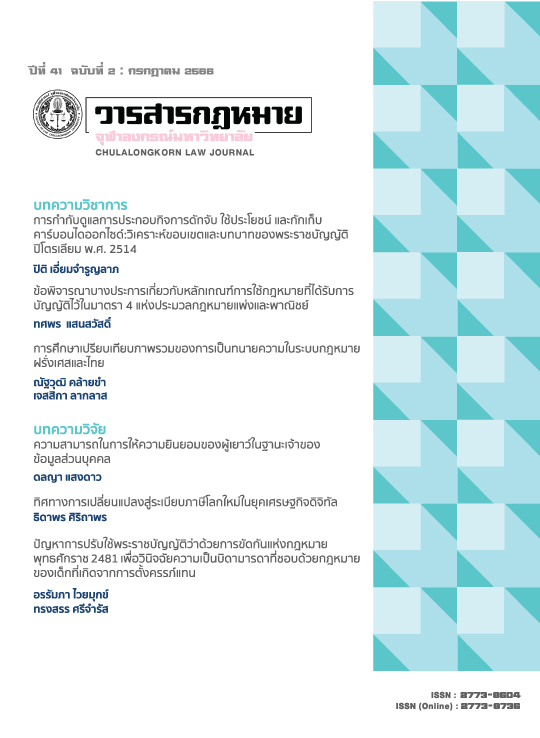การกำกับดูแลการประกอบกิจการดักจับ ใช้ประโยชน์ และกักเก็บคาร์บอนไดออกไซด์: วิเคราะห์ขอบเขตและบทบาทของพระราชบัญญัติปิโตรเลียม พ.ศ. 2514
Main Article Content
บทคัดย่อ
ประเทศไทยมีพันธกรณีตามกฎหมายระหว่างประเทศที่ไม่อาจปล่อยให้มีการดำเนินการเพื่อสำรวจหาแหล่งสะสมและการอัดคาร์บอนลงในแหล่งสะสมในทะเลอาณาเขต เขตเศรษฐกิจจำเพาะ หรือเขตไหล่ทวีปของรัฐโดยปราศจากการอนุญาตและกำกับการประกอบการได้ แม้ว่าพระราชบัญญัติปิโตรเลียม พ.ศ. 2514 จะไม่ได้ถูกตราขึ้นเพื่อนั้นไม่สามารถถูกใช้เป็นฐานทางกฎหมายในการให้สิทธิและกำกับดูแลการดำเนินกิจกรรมกักเก็บคาร์บอนโดยตรง อย่างไรก็ตาม พระราชบัญญัติปิโตรเลียม พ.ศ. 2514 สามารถถูกตีความให้รับรองถึงสิทธิของผู้รับสัมปทานปิโตรเลียมในการ “ใช้ประโยชน์จากคาร์บอนไดออกไซด์” ที่เกิดจากกระบวนการผลิตเพื่อประโยชน์ในการเพิ่มประสิทธิภาพการผลิตได้ อย่างไรก็ตาม การสำรวจและขุดเจาะหลุมเพื่อกักเก็บคาร์บอนและการอัดคาร์บอนไดออกไซด์ที่ดักจับได้ลงในหลุมกักเก็บนั้นมิได้เป็นการดำเนินการเพื่อให้ทราบถึงความมีอยู่ของปิโตรเลียมและมิใช่การนำปิโตรเลียมขึ้นจากแหล่งสะสมแต่เป็นการนำคาร์บอนกลับไปยังแหล่งสะสม (reservoir) การสำรวจพื้นที่และการดำเนินการเพื่อกักเก็บคาร์บอนซึ่งถูกดักจับมาจากพื้นที่นอกแปลงสำรวจและผลิตปิโตรเลียมจึงมิใช่สิ่งที่ต้องขอรับสิทธิตามมาตรา 23 แห่งพระราชบัญญัติปิโตรเลียม พ.ศ. 2514 และไม่ตกอยู่ในบังคับของพระราชบัญญัติปิโตรเลียม พ.ศ. 2514 ส่งผลให้หน่วยงานรัฐตามพระราชบัญญัติปิโตรเลียม พ.ศ. 2514 ไม่อาจอาศัยพระราชบัญญัติปิโตรเลียม พ.ศ. 2514 ในการให้สิทธิและกำกับดูแลการประกอบกิจการดักจับและกักเก็บคาร์บอนไดออกไซด์ได้ ดังนั้น จึงควรมีการตรากฎหมายเฉพาะเพื่อการอนุญาตและกำกับดูแลการประกอบกิจการดักจับและกักเก็บคาร์บอนไดออกไซด์เป็นการเฉพาะตลอดจนจัดตั้งหน่วยงานเฉพาะที่มีหน้าที่และอำนาจในการกำกับดูแลกิจกรรมดังกล่าวเป็นการเฉพาะ อย่างไรก็ตาม ระหว่างที่ยังไม่มีการตรากฎหมายและจัดตั้งหน่วยงานเฉพาะดังกล่าว คณะรัฐมนตรีอาจมอบหมายให้กรมเชื้อเพลิงธรรมชาติให้มีหน้าที่และอำนาจการดำเนินการหรือร่วมดำเนินการกับบุคคลผู้ชำนาญการเพื่อให้ได้มาซึ่งข้อมูลทางธรณีวิทยาในบริเวณอ่าวไทยเพื่อประโยชน์ในการสร้างฐานข้อมูลที่จำเป็นต่อการพัฒนาประกอบกิจการดักจับและกักเก็บคาร์บอนไดออกไซด์ต่อไป
Article Details

อนุญาตภายใต้เงื่อนไข Creative Commons Attribution-NonCommercial-NoDerivatives 4.0 International License.
ลิขสิทธิ์และเนื้อหาในเว็บไซต์ของวารสารกฎหมาย (รวมถึง โดยไม่จำกัดเฉพาะ เนื้อหา รหัสคอมพิวเตอร์ งานศิลป์ ภาพถ่าย รูปภาพ ดนตรีกรรม โสตทัศนวัสดุ) เป็นกรรมสิทธิ์ของวารสารกฎหมาย และผู้ได้รับการโอนสิทธิทุกราย
1. วารสารกฎหมาย ให้อนุญาตให้คุณใช้สิทธิอันไม่เฉพาะเจาะจงที่สามารถถูกถอนเมื่อใดก็ได้ โดยไม่มีค่าใช้จ่าย ในการ
- เยี่ยมชมเว็บไซต์และเอกสารในเว็บไซต์นี้ จากคอมพิวเตอร์หรือเครื่องมือสื่อสารผ่านเว็บบราวเซอร์
- คัดลอกและจัดเก็บเว็บไซต์และเอกสารในเว็บไซต์นี้บนลงคอมพิวเตอร์ของคุณผ่านระบบความจำ cache
- สั่งพิมพ์เอกสารจากเว็บไซต์นี้สำหรับการใช้ส่วนตัวของคุณ
- ผลงานที่ได้รับการตีพิมพ์โดยวารสารกฎหมาย จุฬาลงกรณ์มหาวิทยาลัย ถูกคุ้มครองภายใต้ Creative Commons Attribution 4.0 International License ซึ่งอนุญาตให้ทุกคนสามารถคัดลอก แจกจ่าย ดัดแปลง ส่งต่อ ผลงานได้ ก็ต่อเมื่อผลงานและแหล่งข้อมูลได้รับการอ้างอิงอย่างเหมาะสม
2. วารสารกฎหมาย จุฬาลงกรณ์มหาวิทยาลัย สงวนสิทธิ์ไม่อนุญาตให้คุณใช้สิทธิอื่นใดที่เกี่ยวข้องกับเว็บไซต์และเอกสารบนเว็บไซต์นี้ เช่น การคัดลอก ดัดแปลง เปลี่ยนแปลง ส่งต่อ ตีพิมพ์ แจกจ่าย เผยแพร่ จัดแสดงในที่สาธารณะ ไม่ว่าจะในรูปแบบใดก็ตาม ซึ่งเว็บไซต์หรือเอกสารบนเว็บไซต์ โดยไม่อ้างอิงถึงแหล่งข้อมูลหรือโดยไม่ได้รับอนุญาตเป็นลายลักษณ์อักษรจากวารสารกฎหมาย จุฬาลงกรณ์มหาวิทยาลัย
3. คุณอาจขออนุญาตที่จะใช้เอกสารอันมีลิขสิทธิ์บนเว็บไซต์นี้โดยการเขียนอีเมลล์มายัง journal@law.chula.ac.th
4. วารสารกฎหมาย จุฬาลงกรณ์มหาวิทยาลัย เข้มงวดกับการคุ้มครองลิขสิทธิ์อย่างมาก หากวารสารกฎหมาย จุฬาลงกรณ์มหาวิทยาลัยพบว่าคุณได้ใช้เอกสารอันมีลิขสิทธิ์บนเว็บไซต์นี้โดยไม่ถูกต้องตามการอนุญาตให้ใช้สิทธิ ดังที่กล่าวไปข้างต้น วารสารกฎหมาย จุฬาลงกรณ์มหาวิทยาลัยอาจดำเนินคดีตามกฎหมายต่อคุณได้ เพื่อเรียกร้องค่าเสียหายที่เป็นตัวเงินและคำขอชั่วคราวให้คุณหยุดการใช้เอกสารดังกล่าว ทั้งนี้ คุณอาจถูกสั่งให้ชดใช้ค่าใช้จ่ายใดๆ ที่เกี่ยวข้องกับการดำเนินการตามกฎหมายนี้
หากคุณพบเห็นการใช้เอกสารอันมีลิขสิทธิ์ของวารสารกฎหมาย จุฬาลงกรณ์มหาวิทยาลัย ที่ขัดหรืออาจขัดต่อการอนุญาตให้ใช้สิทธิดังที่ได้กล่าวไปข้างต้น โดยเชื่อว่าได้ละเมิดลิขสิทธิ์ของคุณหรือของผู้อื่น สามารถร้องเรียนมาได้ที่ journal@law.chula.ac.th
เอกสารอ้างอิง
Article 1 of Convention on the Prevention of Marine Pollution by Dumping of Wastes and other Matter 1972.
Article 3 paragraph 1 of Protocol to the Convention on the Prevention of Marine Pollution by Dumping of Wastes and Other Matter 1996.
Article 60 & Article 80 of United Nations Convention on the Law of the Sea 1982.
Depositary. United Nations Framework Convention on Climate Change. [Online] Available from : https://treaties.un.org/Pages/ViewDetailsIII.aspx?src=IND&mtdsg_no=XXVII-7&chapter=27&Temp=mtdsg3&clang=_en [4 April 2023]
House of Representatives Standing Committee on Science and Innovation. Between a rock and a hard place: The science of geosequestration. Australia: The Parliament of the Commonwealth of Australia, 2007.
IEAGHG. What is CCS?. [Online] Available from : https://ieaghg.org/ccs-resources/what-is-ccs# [13 October 2022]
International Energy Agency (IEA). Carbon Capture and Storage: Legal and Regulatory Review (edition 2). [Online] Available from : https://iea.blob.core.windows.net/assets/22a9ef17-868c-4dd4-8881-ffa2b888a695/ccs_legal.pdf [13 October 2022]
IPCC. Carbon Dioxide Capture and Storage. New York: Cambridge University Press, 2005.
Karl W. Bandilla. Carbon Capture and Storage. Trevor M. Letcher (ed) Future Energy: Improved, Sustainable and Clean Options for our Planet. Candice Janco, 2020.
Maria Mousmouti. Making Legislative Effectiveness an Operational Concept: Unfolding the Effectiveness Test as a Conceptual Tool for Lawmaking. European Journal of Risk Regulation 9(3) (2018): 445-452.
Nelson Barros, Gisela M. Oliveira, M. J. Lemos de Sousa. Environmental Impact Assessment of Carbon Capture and Sequestration: General overview. [online] Available from : https://conferences.iaia.org/2012/pdf/uploadpapers/Final% 20 papers %20review%20process/Oliveira,%20Gisela.% 20%20Environmental%20Impact%20Assessment%20of%20Carbon %20Capture%20 and%20Sequestration.pdf [12 October 2022]
Office of Fossil Energy and Carbon Management. Enhanced Oil Recovery. [online] Available from : https://www.energy.gov/ fecm/enhanced-oil-recovery [23 February 2023]
PTTEP. ปตท.สผ. นำร่องศึกษาและพัฒนาโครงการ CCS ครั้งแรกในประเทศไทย หนุนเป้าหมายลดปล่อยก๊าซเรือนกระจกเป็นศูนย์. [ออนไลน์] แหล่งที่มา : https://www.pttep.com/th/Newsandnmedia/News/Pttep-Initiates-Thailand-First-Ccs-Project-Pushing-Towards-Net-Zero-Green-House-Gas-Emissions.aspx [13 ตุลาคม 2565]
Ronald E. Terry. Enhanced Oil Recovery. Robert A. Meyers (eds) Encyclopedia of Physical Science and Technology. 3rd ed. Academic Press, 2001.
Section 2(1) of Petroleum Act 1998.
Section 20(3) of UK Energy Act.
แผนที่นำทางการลดก๊าซเรือนกระจกของประเทศ ปี พ.ศ. 2564
แผนพัฒนากำลังผลิตไฟฟ้าของประเทศไทย (พ.ศ. 2561 - 2580) ฉบับปรับปรุงครั้งที่ 1
กุลนันทน์ วีรณรงค์กร และอมรชัย อาภรณ์วิชานพ. แนวทางการนำก๊าซคาร์บอนไดออกไซด์มาใช้ประโยชน์. [online] Available from : https://www.tpa. or.th/publisher/pdfFileDownloadS/TN%20255p30-34.pdf [20 กุมภาพันธ์ 2566]
ข้อ 2 กฎกระทรวงแบ่งส่วนราชการกรมเจ้าท่า กระทรวงคมนาคม พ.ศ. 2558
ข้อ 2 กฎกระทรวงแบ่งส่วนราชการกรมเชื้อเพลิงธรรมชาติ กระทรวงพลังงาน พ.ศ. 2562
มาตรา 22(1) พระราชบัญญัติปิโตรเลียม พ.ศ. 2514
มาตรา 4 พระราชบัญญัติปิโตรเลียม พ.ศ. 2514
ร่างพระราชบัญญัติการป้องกันมลพิษทางทะเลเนื่องจากการทิ้งเทของเสียหรือวัสดุอื่นลงทะเล พ.ศ. .... (เสนอและเผยแพร่เพื่อการแสดงความคิดเห็นโดยกรมเจ้าท่าเมื่อวันที่ 10 ตุลาคม พ.ศ. 2565), มาตรา 4(3) ประกอบมาตรา 16.


